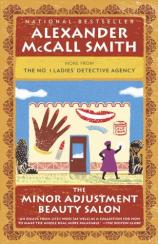Excerpt
Excerpt
The Minor Adjustment Beauty Salon: No. 1 Ladies' Detective Agency

There had been no further debate on the issue, and Mma Ramotswe had learned to steer clear of certain topics—such as that one—that could be guaranteed to elicit an extreme response from her somewhat prickly assistant. Mma Makutsi had many merits, she came to realise, and these easily outweighed her occasional faults. And now, with Mma Makutsi on maternity leave and the office seeming strangely quiet as a result, there was something else that she came to realise: she missed her assistant in a way and to a degree that she had never anticipated. She missed her occasional outbursts; she missed her comments on what was in the newspapers; she even missed the way in which she would intervene in the conversation Mma Ramotswe was having with clients, dropping in observations from her position to the rear and making them stop and turn their heads to reply to somebody over their shoulder—not an easy thing to do. All of that she missed, just as she missed Mma Makutsi’s knack of putting her teacup down on the desk in a manner that so completely revealed her thinking on the subject under discussion. There was nobody else she knew who could put a cup down on a desk to quite the same effect. It was, she decided, one of the many respects in which Mma Makutsi was—and here she could think of only one word to express it—irreplaceable. There simply could never be another Mma Makutsi. There could never be another woman from Bobonong, of all places, with flashing round glasses and ninety-seven per cent in the final examinations of the Botswana Secretarial College. There could never be another person who was even remotely capable of standing up to somebody like Mma Potokwane, or putting Charlie in his place when, with all the confidence and ignorance of the young male, he made some outrageous comment. If Mma Makutsi decided not to return from maternity leave then Mma Ramotswe thought that the No. 1 Ladies’ Detective Agency would never be the same again, and might not be worth continuing with.
She looked about her. She had worked as a detective for some years now, and in that time she had done her best for her clients. She liked to think that she had made a difference to the lives of at least some people and helped them to deal with problems that had become too burdensome for them to handle on their own. Now, however, surveying the shabby little office, she wondered whether she really had achieved very much. It was a rare moment of gloom, and it was at this point that she realised she was doing something that she very seldom did. She supported many people in their tears—for tears could so easily come to those who were recounting their troubles—but there were few occasions on which she herself cried. If you are there to staunch the tears of the world, then it does not cross your mind that you yourself may weep. But now she did, not copiously but discreetly and inconsequentially, and barely noticeably—except to Mr. J.L.B. Matekoni, who chose that moment to come into the room, wiping the grease off his hands, ready with a remark about what he had just discovered under the latest unfortunate car.
For a moment he stood quite still. Then, letting the lint fall from his hands, he swiftly crossed the room and put his arm about his wife’s shoulder, lowering his head so that they were cheek to cheek and she could feel the stubble on his chin and the warmth of his breath.
“My Precious, my Precious.”
She reached up and took his hand. There was still a smear on it—some vital fl uid of the injured car to which he had been attending—but she paid no attention to that.
“I’m sorry,” she said. “There is really no reason for me to cry. I am being silly.”
“You are not silly, Mma. You are never silly. What is it?”
With her free hand she took the handkerchief from where it was tucked into the front of her dress. She blew her nose, and with some determination too. After all, the blowing of a nose can be the punctuation that brings such moments to an end.
“I am much better now,” she said. “I have been sitting and thinking when I should be working. And without Mma Makutsi to talk to, well, you know how hard it can be to sit with the problems of other people.”
He knew, or thought he knew. Yes, he knew how she felt. “Just like cars,” he said. “You sit and look at a car and you think of all its problems, and it can get you down.”
“Yes, I’m sure it can.” She smiled at him. “I’ll be all right, Mr. J.L.B. Matekoni. Mma Makutsi will come back and everything will be the same again.”
He removed his hand from her shoulder and stood up. “I will make you tea,” he said.
She looked at him with fondness. For some reason, Mr. J.L.B. Matekoni did not make very good tea. It was something to do with the quantities of tea he put in the pot, or with not allowing the water to boil properly, or with the way he poured it. For whatever reason, his tea was never quite of the standard achieved by her or by Mma Makutsi. So she thanked him and said that it would be good for her to do something instead of sitting at her desk and moping, and then she made the tea for herself and for her husband, and for Charlie and Fanwell too, and Mr. J.L.B. Matekoni took his cup back into the garage where he sipped at it thoughtfully while he decided what to do.




